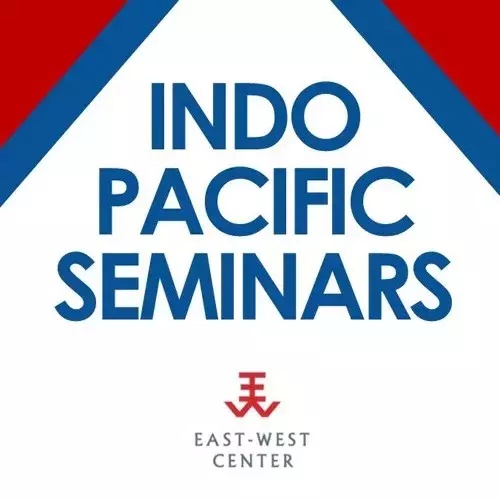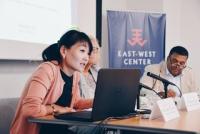Error message

OFFICE/DEPARTMENT
The New Geopolitical Environment’s Impact on US- Mongolia Relations
An Indo Pacific Foreign Policy and Defense Seminar featuring:
Soyolgerel Nyamjav
Asia Studies Visiting Fellow
East-West Center in Washington
Dr. Alicia Campi (Discussant)
Adjunct Professor, Reischauer Center, Johns Hopkins SAIS and President, The Mongolia Society
Dr. Satu Limaye (Moderator)
Director, East-West Center in Washington
Mongolia and the United States celebrated the 30th anniversary of their diplomatic relations last year. While the two countries have gone through different levels of development, reform, and economic booms in their domestic environments, the

achievements in their bilateral ties are based on shared principles and values. During the past thirty years, Mongolia and the United States have expanded relations through diplomatic means in the political, economic, humanitarian, and defense sectors. Current Mongolia-US relations have involved spreading democratic values and human rights, implementing policies to enable a market-based economy, and military cooperation to promote regional peace and security.
The main directions of Mongolia’s foreign policy are prioritizing relations with China and Russia, diversifying its relations through its ‘third neighbor’ policy, actively contributing to international organizations and mechanisms, and strengthening its position in the Asian region. The United States is the largest and more important “third neighbor” partner. Mongolia’s “third neighbor” policy permits for the enlargement of relations via bilateral, trilateral, and multilateral agreements between global and regional actors. Under the Trump administration, Mongolia does not anticipate any negative changes in foreign policy or bilateral relations. In fact, the "Indo-Pacific Strategy" may create opportunities for Mongolia to expand joint activities, as well as political, and economic ties with the US. Both sides have expressed their commitment to deepening the economic relationship between two countries. The seminar will note substantial discussions regarding the political and economic aspects of the United States’ “Indo-Pacific Strategy”, Mongolia’s foreign policy ambitions, macroeconomic issues and investment climate, export diversification of Mongolian goods and services, renewable energy, and the environment.
For more images, please visit the album for this event on the East-West Center's Flickr page.
Soyolgerel Nyamjav currently serves as a senior researcher at the Institute for Strategic Studies, Mongolia’s leading think tank. The Institute is an independent research arm of the National Security Council of Mongolia. Prior to that, Soyolgerel was a lecturer in political science. She is also a member of the Mongolian Political Science Association and the Young Diplomats Club. She has served on working groups to draft strategy, law, and other policy papers concerning the foreign policy of Mongolia. Soyolgerel has presented papers to international conferences held in Mongolia and abroad and published articles on her research topics. She has written on foreign policy of major powers towards Central and Northeast Asia, regional conflict, and the role of regional multilateral mechanisms and initiatives. She has attended the Advanced Security Cooperation course at the APCSS, Hawaii and the Program on Applied Security Studies (PASS) at the George C. Marshall European Center for Security Studies. She holds a bachelors and Master’s degree in political science from the National University of Mongolia. She speaks Mongolian, Russian, English, and Turkish.
Dr. Alicia Campi adjunct professor at the Reischauer Center in SAIS/Johns Hopkins University and President of The Mongolia Society (Bloomington, Indiana USA) since 2007, is a specialist in Mongolian Studies and Northeast Asia. She has an M.A. from Harvard University and Ph.D. from Indiana University. She had a 14 year diplomatic career with the US government and in the mid-1980s in Tokyo she conducted preliminary negotiations leading to the establishment of US-Mongolian diplomatic relations. She has numerous publications on modern Mongolian political affairs, its energy resource policies, and deeper integration into Eurasia. Her new book on Mongolian Foreign Policy will be released in 2019.
Dr. Satu Limaye is the Director of the East-West Center in Washington and creator of the Asia Matters for America/America Matters for Asia initiative. Dr. Limaye is also Senior Advisor, CNA Corporation. Earlier, Dr. Limaye served on the research staff of the Strategy, Forces & Resources Division at the Institute for Defense Analyses (IDA) and Director of Research & Publications at the Asia Pacific Center for Security Studies. His recent publications include: Weighted West, Focused on the Indian Ocean and Cooperating Across the Indo-Pacific: India’s New Maritime Strategy, Capabilities and Diplomacy (CNA, 2017); “Integrating an Ally and an Aligner in a ‘Principled Security Network’: The U.S. and the India-Japan Strategic Partnership” in Rajesh Basrur and Sumithi Narayanan Kutty (eds.) The India-Japan Strategic Partnership, Springer: 2018; “ASEAN is Neither the Problem Nor Solution to South China Sea Disputes,” in Gilbert Rozman and Joseph Chinyong Liow, International Relations and Asia’s Southern Tier, 2017; “From Peak to Plateau in U.S.-ASEAN Relations,” in Mari Elka Pangestu and Rastam Mohd Isa (eds.), ASEAN Future Forward, 2017. Dr. Limaye also writes the annual analysis of India-East Asia and US-India relations for the Pacific Forum CSIS journal Comparative Connections. He is a magna cum laude and Phi Beta Kappa graduate of Georgetown University and received his doctorate from Oxford University (Magdalen College) where he was a George C. Marshall Scholar.
The New Geopolitical Environment’s Impact on US- Mongolia Relations
An Indo Pacific Foreign Policy and Defense Seminar featuring:
Soyolgerel Nyamjav
Asia Studies Visiting Fellow
East-West Center in Washington
Dr. Alicia Campi (Discussant)
Adjunct Professor, Reischauer Center, Johns Hopkins SAIS and President, The Mongolia Society
Dr. Satu Limaye (Moderator)
Director, East-West Center in Washington
Mongolia and the United States celebrated the 30th anniversary of their diplomatic relations last year. While the two countries have gone through different levels of development, reform, and economic booms in their domestic environments, the

achievements in their bilateral ties are based on shared principles and values. During the past thirty years, Mongolia and the United States have expanded relations through diplomatic means in the political, economic, humanitarian, and defense sectors. Current Mongolia-US relations have involved spreading democratic values and human rights, implementing policies to enable a market-based economy, and military cooperation to promote regional peace and security.
The main directions of Mongolia’s foreign policy are prioritizing relations with China and Russia, diversifying its relations through its ‘third neighbor’ policy, actively contributing to international organizations and mechanisms, and strengthening its position in the Asian region. The United States is the largest and more important “third neighbor” partner. Mongolia’s “third neighbor” policy permits for the enlargement of relations via bilateral, trilateral, and multilateral agreements between global and regional actors. Under the Trump administration, Mongolia does not anticipate any negative changes in foreign policy or bilateral relations. In fact, the "Indo-Pacific Strategy" may create opportunities for Mongolia to expand joint activities, as well as political, and economic ties with the US. Both sides have expressed their commitment to deepening the economic relationship between two countries. The seminar will note substantial discussions regarding the political and economic aspects of the United States’ “Indo-Pacific Strategy”, Mongolia’s foreign policy ambitions, macroeconomic issues and investment climate, export diversification of Mongolian goods and services, renewable energy, and the environment.
For more images, please visit the album for this event on the East-West Center's Flickr page.
Soyolgerel Nyamjav currently serves as a senior researcher at the Institute for Strategic Studies, Mongolia’s leading think tank. The Institute is an independent research arm of the National Security Council of Mongolia. Prior to that, Soyolgerel was a lecturer in political science. She is also a member of the Mongolian Political Science Association and the Young Diplomats Club. She has served on working groups to draft strategy, law, and other policy papers concerning the foreign policy of Mongolia. Soyolgerel has presented papers to international conferences held in Mongolia and abroad and published articles on her research topics. She has written on foreign policy of major powers towards Central and Northeast Asia, regional conflict, and the role of regional multilateral mechanisms and initiatives. She has attended the Advanced Security Cooperation course at the APCSS, Hawaii and the Program on Applied Security Studies (PASS) at the George C. Marshall European Center for Security Studies. She holds a bachelors and Master’s degree in political science from the National University of Mongolia. She speaks Mongolian, Russian, English, and Turkish.
Dr. Alicia Campi adjunct professor at the Reischauer Center in SAIS/Johns Hopkins University and President of The Mongolia Society (Bloomington, Indiana USA) since 2007, is a specialist in Mongolian Studies and Northeast Asia. She has an M.A. from Harvard University and Ph.D. from Indiana University. She had a 14 year diplomatic career with the US government and in the mid-1980s in Tokyo she conducted preliminary negotiations leading to the establishment of US-Mongolian diplomatic relations. She has numerous publications on modern Mongolian political affairs, its energy resource policies, and deeper integration into Eurasia. Her new book on Mongolian Foreign Policy will be released in 2019.
Dr. Satu Limaye is the Director of the East-West Center in Washington and creator of the Asia Matters for America/America Matters for Asia initiative. Dr. Limaye is also Senior Advisor, CNA Corporation. Earlier, Dr. Limaye served on the research staff of the Strategy, Forces & Resources Division at the Institute for Defense Analyses (IDA) and Director of Research & Publications at the Asia Pacific Center for Security Studies. His recent publications include: Weighted West, Focused on the Indian Ocean and Cooperating Across the Indo-Pacific: India’s New Maritime Strategy, Capabilities and Diplomacy (CNA, 2017); “Integrating an Ally and an Aligner in a ‘Principled Security Network’: The U.S. and the India-Japan Strategic Partnership” in Rajesh Basrur and Sumithi Narayanan Kutty (eds.) The India-Japan Strategic Partnership, Springer: 2018; “ASEAN is Neither the Problem Nor Solution to South China Sea Disputes,” in Gilbert Rozman and Joseph Chinyong Liow, International Relations and Asia’s Southern Tier, 2017; “From Peak to Plateau in U.S.-ASEAN Relations,” in Mari Elka Pangestu and Rastam Mohd Isa (eds.), ASEAN Future Forward, 2017. Dr. Limaye also writes the annual analysis of India-East Asia and US-India relations for the Pacific Forum CSIS journal Comparative Connections. He is a magna cum laude and Phi Beta Kappa graduate of Georgetown University and received his doctorate from Oxford University (Magdalen College) where he was a George C. Marshall Scholar.









